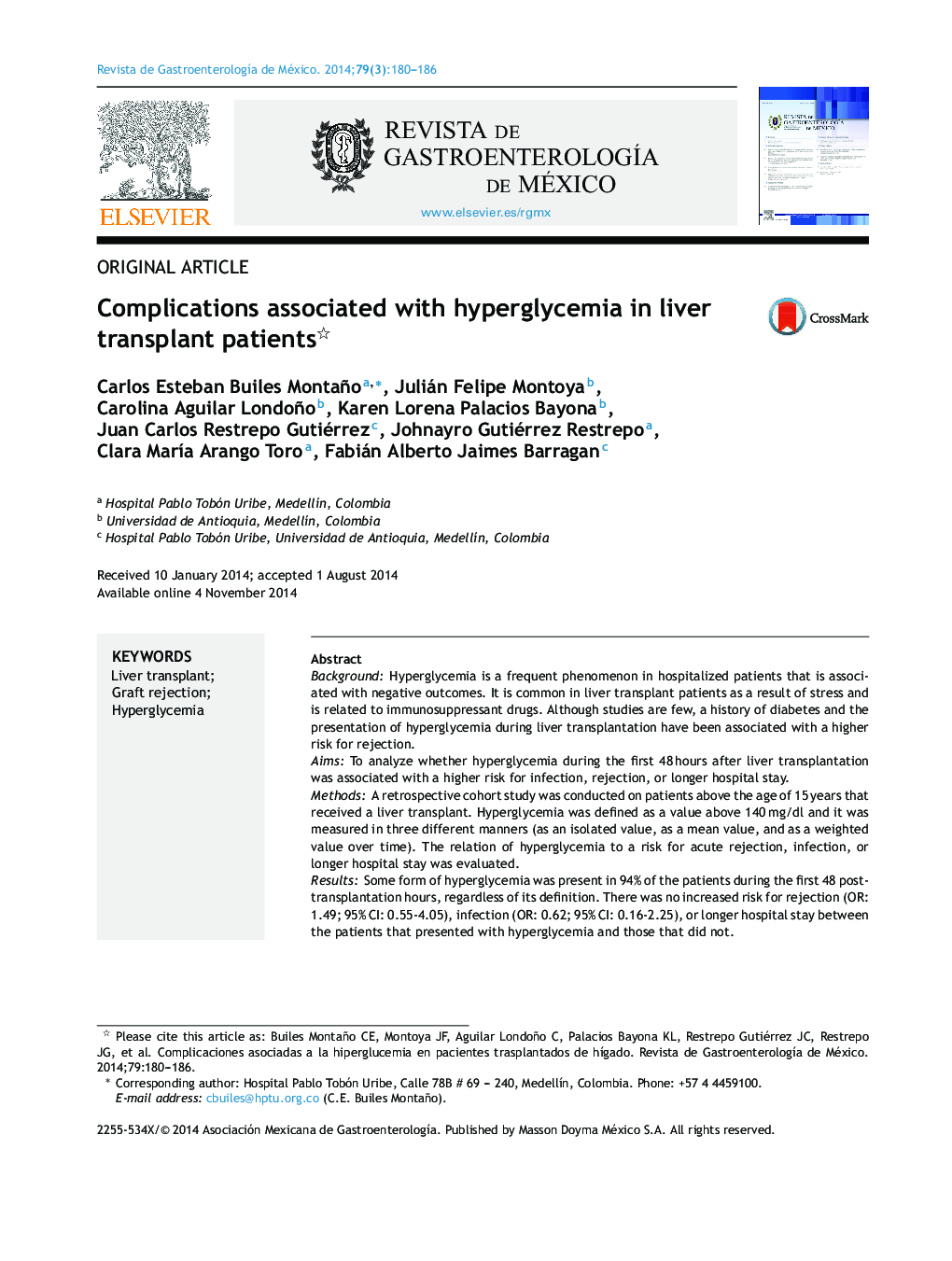| کد مقاله | کد نشریه | سال انتشار | مقاله انگلیسی | نسخه تمام متن |
|---|---|---|---|---|
| 3319122 | 1211664 | 2014 | 7 صفحه PDF | دانلود رایگان |
BackgroundHyperglycemia is a frequent phenomenon in hospitalized patients that is associated with negative outcomes. It is common in liver transplant patients as a result of stress and is related to immunosuppressant drugs. Although studies are few, a history of diabetes and the presentation of hyperglycemia during liver transplantation have been associated with a higher risk for rejection.AimsTo analyze whether hyperglycemia during the first 48 hours after liver transplantation was associated with a higher risk for infection, rejection, or longer hospital stay.MethodsA retrospective cohort study was conducted on patients above the age of 15 years that received a liver transplant. Hyperglycemia was defined as a value above 140 mg/dl and it was measured in three different manners (as an isolated value, as a mean value, and as a weighted value over time). The relation of hyperglycemia to a risk for acute rejection, infection, or longer hospital stay was evaluated.ResultsSome form of hyperglycemia was present in 94% of the patients during the first 48 post-transplantation hours, regardless of its definition. There was no increased risk for rejection (OR: 1.49; 95% CI: 0.55-4.05), infection (OR: 0.62; 95% CI: 0.16-2.25), or longer hospital stay between the patients that presented with hyperglycemia and those that did not.ConclusionsHyperglycemia during the first 48 hours after transplantation appeared to be an expected phenomenon in the majority of patients and was not associated with a greater risk for rejection or infection and it had no impact on the duration of hospital stay.
ResumenAntecedentesLa hiperglucemia es un fenómeno frecuente en los pacientes hospitalizados asociado a desenlaces negativos, y es frecuente en los pacientes trasplantados de hígado como un fenómeno de estrés y asociada a medicamentos inmunosupresores. Aunque los estudios son escasos, el antecedente de diabetes, así como la hiperglucemia durante el trasplante hepático, se han asociado con mayor riesgo de rechazo.ObjetivoEstudiar si la hiperglucemia durante las primeras 48 h después de un trasplante hepático se asocia a un mayor riesgo de infección, rechazo o estancia hospitalaria.MétodosEstudio de cohorte de tipo retrospectivo en pacientes mayores de 15 años que recibieron un trasplante hepático. Se definió la hiperglucemia como un valor superior a 140 mg/dl y se midió de 3 maneras diferentes (como un valor aislado, como la media de los valores y como un valor ponderado en el tiempo) y se analizó su relación con el riesgo de rechazo agudo, infección y tiempo de estancia hospitalaria.ResultadosUn 94% de los pacientes presentó alguna forma de hiperglucemia durante las primeras 48 h postrasplante independientemente de cómo esta fue definida, y no hubo un mayor riesgo de rechazo (OR: 1.49; IC 95%: 0.55-4.05), infección (OR: 0.62; IC 95%: 0.16-2.25) o tiempo de estancia hospitalaria entre los pacientes que la presentaron y los que no.ConclusiónLa hiperglucemia durante las primeras 48 h después de un trasplante pareciera ser un fenómeno esperable en la mayoría de pacientes y no se asocia a un mayor riesgo de rechazo, infección y no impacta en el tiempo de estancia hospitalaria.
Journal: Revista de Gastroenterología de México (English Edition) - Volume 79, Issue 3, July–September 2014, Pages 180–186
